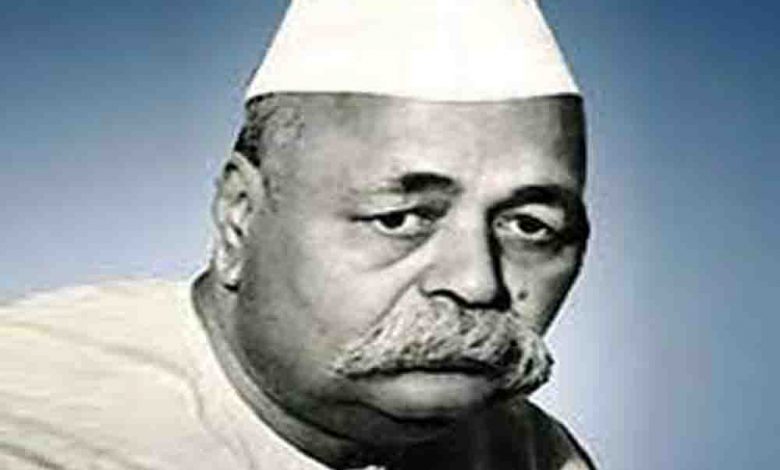A tribute to the illustrious legacy of Govind Ballabh Pant

Friday, 10 September 2021 | Neeraj Kumar Pande
GUEST COLUMN
 Neeraj Kumar Pande
Neeraj Kumar Pande
Once a victim of British policy of economic drain, the Indian economy is now the seventh largest across the globe despite the challenges posed by the Covid-19 pandemic. From a feeble post partition economy to one among the global giants , the journey has been far from smooth. However even before any accolades can be awarded to contemporary policy makers, administrators or the citizenry, it would be an unforgivable bias to not acknowledge the role played by Indian freedom fighters. The entire course of the nineteenth as well as twentieth century is replete with stories of valour and legends of sacrifice made by stalwarts of Indian national movement. September 10 marks the birth anniversary of one such eminent and illustrious personality. He fought tooth and nail against colonial oppression while also working tirelessly in various positions in the newly minted political landscape of the nation.
Govind Ballabh Pant was not only a key figure in the independence struggle but also one of the architects of modern India. Alongside leaders like Jawaharlal Nehru and Vallabh Bhai Patel, he was a pivotal figure in the Indian government. He hailed from an erudite and traditional family from Khoont village near Almora. After graduating from the coveted Allahabad University, he chose to pursue law. However those were also the heydays of the national movement in the country. As early as 1914, he raised his voice against the inhuman practice of Coolie Beggar that was popular in the Kumaon region of the erstwhile United Provinces. The local villagers would be compelled to carry luggage of visiting British officers and run other sub human errands for them without being paid. Hence a movement broke out against the Raj, where GB Pant assisted a local group in their successful challenge to the practice. The success of the initiative caught the attention of MK Gandhi as well. When in 1921 he entered the political domain officially, he was elected to the Legislative Assembly of the erstwhile United Provinces of Agra and Oudh. Being a brilliant lawyer, the Congress party had appointed him to initially represent Ram Prasad Bismil, Ashfaqulla Khan and other revolutionaries who were involved in the Kakori case in the mid 1920s. When there was an indignation caused to the people of the country owing to the racial overtones of British appointed Simon commission in 1928, GB Pant along with other fellow nationalists expressed his resentment openly. In fact Jawaharlal Nehru in his autobiography has lauded the courage with which Pant participated in the anti Simon protests. He had sustained an agonising spine injury as the British soldiers lashed out at the protesters. While it had left him physically incapacitated for the remaining part of his life this blow could not diminish his unrelenting spirit or patriotism. He attempted organising salt March on the lines of Gandhi’s model and with his wisdom even meditated between the ideologically opposite factions led by Subhas Chandra Bose and Gandhi. In 1940 he faced the British government’s wrath once again as he was put behind bars for supporting Gandhi’s Satyagraha. However these threats only saw him become more voraciously involved in the freedom movement. When the entire country was bubbling with the fervour of Quit India Movement in 1942, Pant became one of the leaders at forefront of signing the Quit India resolution. This yielded another opportunity to the draconian colonial Raj to arrest him. With declining health yet stoic passion he spent three years in Ahmednagar Fort prison along with other members of the then Congress working committee until March 1945. Nehru had at that point pleaded successfully for his release from there on grounds of ill health.
Although earlier as well he had made a stint as the first chief minister of United Provinces, he assumed this position once again in 1946. He not only successfully abolished the exploitative Zamindari system here but also revolutionised laws pertaining to women’s inheritance and marriage. He was appointed Minister of Home Affairs in the Union Cabinet on 10 January 1955 in New Delhi by Nehru. In this position he not only contributed in the mammoth reorganisation of Indian states on a linguistic basis but also pushed for Hindi being made the official language of the government.
For the distinguished contributions which he made to the nation, he was awarded the Bharat Ratna in 1957. This has been a matter of great pride for everyone in his home state. For, although Uttarakhand took shape as a separate state only in 2000, with his foresight Pant had already begun contemplating multidimensional development for the mountainous regions long before 1947. He laid emphasis on establishment of schools, hospitals and banks to ensure economic and social growth in the hill towns of the erstwhile Uttar Pradesh. At the time when formal education for most women was still a remote dream, he insisted on permitting girls to attend schools. He also spoke against regressive customs of early marriage of girls and child labour. He himself once said, “Let us remember that it is the citizen that must count. It is the citizen that forms the base as well as the summit of the social pyramid.”
No wonder today his name resonates in many educational, environmental and medical institutions, particularly in Delhi, Uttar Pradesh and Uttarakhand.The GB Pant University of Agriculture and Technology at Pantnagar is considered to have played a vital role in India’s green revolution. Nehru while inaugurating the university in 1960, recollected Pant’s contributions with teary eyes. The Birla Vidya Mandir in Nainital which continues to rank among the best Indian residential schools, was also a brainchild of Pant. In fact there is so much more which Uttarakhand owes to him. The legacy of the state is only a reflection of his great legacy. Indeed leaders with such vision of social welfare and Mukti sectoral development are rare. It was nothing short of utter good fortune for the people of Uttarakhand as well as entire country to have had such a distinguished leader, who has etched a luminous past for them.
In the words of historians, he was a man with an iron will, a sobriquet which he lived until he breathed his last in 1961. Today he is a testimony of how, by a strong vision and philanthropist outlook one can change the world around himself/ herself.
(The writer is a retired civil servant. Views expressed are personal)






